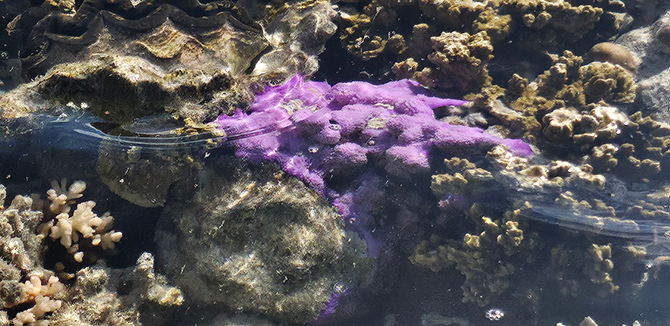Focusing Biotech on Sustainability
MBP Director Danielle Tullman-Ercek traveled to a conference in Australia and saw first-hand the stress climate change is putting on natural wonders; her goal is to train students to use biology to help fix it.

As Danielle Tullman-Ercek's airplane began its final descent into Australia, her eyes focused on the vibrant neon colors of the coral reef shining through the ocean’s waters below.
But as beautiful as those colors were, they also communicated a dire warning – a warning at the heart of why Tullman-Ercek flew nearly 9,000 miles in the first place.
Tullman-Ercek, the director of Northwestern Engineering's Master of Biotechnology Program (MBP), was on her way to Heron Island, a tropical speck of land off Australia’s east coast, to attend a conference on using biotechnology to combat climate change. There she learned that coral turning such eye-catching colors was a byproduct of global warming — and the coral's last-gasp attempt to survive.
Seeing how climate change could impact such a beautiful ecosystem inspired Tullman-Ercek to bring back to campus what she learned at the conference.
“A big part of my job is to use what I learn to inspire future students and current students,” she said. “The other part is incorporating those lessons into our curriculum. I already brought things I learned in Australia back to the classroom and talked about the technologies that were being developed.”
Those technologies are aimed at feeding microbes the carbon waste we produce as humans. These tiny creatures can be engineered to transform carbon into helpful resources, such as environmentally friendly fuel.
Tullman-Ercek was invited to attend the conference by its co-organizer, Michael Koepke, MBP Industry Advisory Board member and chief innovation officer at LanzaTech. Multiple MBP alumni work at LanzaTech, whose headquarters are located five miles west of Northwestern in nearby Skokie.
“A lot of people, when they hear biotechnology, they'll think of medicine, and that's certainly an application that we teach in the program,” Tullman-Ercek said. “But there is this other application on the sustainability side that we want to focus on as well. We want to help students solve global problems using their skills in biological engineering.”
The potential for such microbial biotechnology is immense. LanzaTech shows it is possible to engineer microbes to turn waste into replacements for petroleum-based products. The list of those items is lengthy, from gasoline to plastics and lubricants.
The problem right now is scale.
“We need more people with expertise in how to grow large batches of microbes that can do this conversion, and that is exactly what MBP teaches,” Tullman-Ercek said. “It has to be cheap enough to replace petroleum, and we have to be able to make tons.”
In other words, one successful biotechnology company such as LanzaTech is a drop in the ocean of companies needed to address the problems carbon creates for our environment.
“Basically, we need a thousand more companies like LanzaTech doing this to even just offset the problems that we are causing each year,” Tullman-Ercek said. “And that’s before we’re able to address the issues that we've already made over the last few decades.”
Which is why the vibrant neon coral reef had such a big impact on Tullman-Ercek. Seeing something so beautiful that could be in its last throes before dying increased Tullman-Ercek’s resolve to help make a difference.
“It was right in front of us, seeing that this could happen, and so it's really important to do what we can to offset it,” she said. “The most important thing is to get the message out that biotech can be used for sustainability.”

